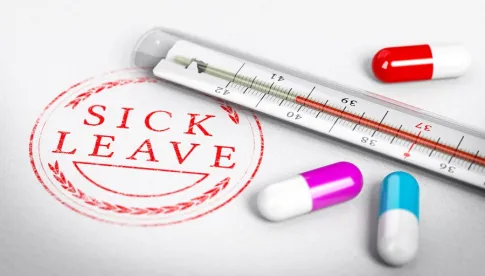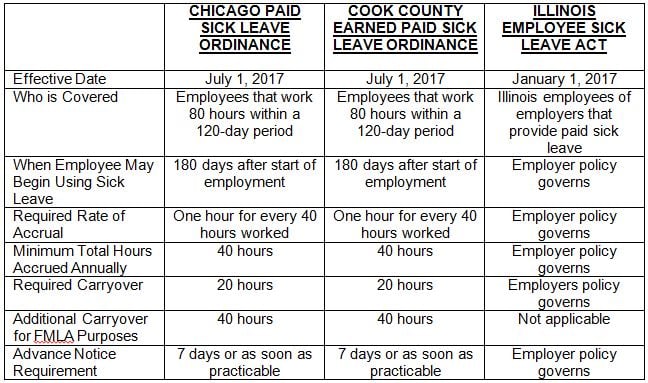Chicagoland employers are bracing for a recurring bout of compliance-related headaches as three new laws—the Chicago Paid Sick Leave Ordinance, the Cook County Earned Paid Sick Leave Ordinance and the Illinois Employee Sick Leave Act—go into effect in 2017. These laws create considerable uncertainty given the extent of their coverage, eligibility criteria and the various requirements they impose. Regardless of whether or not an employer operates in Chicago, Cook County or elsewhere in the State of Illinois, now is the time to take stock of each new law to determine whether it applies to your organization and what obligations it imposes.
Chicago Paid Sick Leave Ordinance
The Chicago Paid Sick Leave Ordinance (SLO) takes effect on July 1, 2017. It amends the existing Minimum Wage Ordinance to mandate Chicago employers provide the following:
-
40 hours of paid sick leave for every 12-month period of employment.
-
A carryover of 20 unused paid sick leave hours to the following 12-month period.
-
An additional carryover of 40 hours to be used for FMLA qualifying purposes.
Covered Employers: Employers are covered by the SLO if: (1) they maintain a business facility within the geographic boundaries of the City of Chicago or are subject to at least one of Chicago's licensing requirements and (2) have at least one covered employee. A covered employee is an employee that works at least two hours during any two-week period within the City of Chicago. This includes employees that may travel for deliveries or sales calls, but it does not include uncompensated time spent driving through the city.
Eligible Employees: Employees are eligible for paid sick leave once they have worked 80 hours within a 120-day period. Employers do not have to permit an employee to use paid sick leave until the employee has been employed for 180 days.
Grounds for Leave: Employees may use sick time for an employee's own illness or to receive medical care, treatment, diagnosis or preventative medical care. Additionally, the paid sick leave may be used for the same purposes for a member of an employee's family. The SLO further provides that paid sick leave may be used when the employee or an employee's family member is a victim of domestic violence or sexual abuse or when a business is closed due to a public health emergency. "Family" is defined broadly and includes any individual related by blood or whose close association with the employee is the equivalent of a family relationship, such as foster parents and step-relationships.
Certification: If an employee takes more than three days of paid sick leave, the employer may require a physician's certification confirming that the leave was permitted under the SLO. An employer may not require that the documentation specify the nature of the illness, injury or condition for which the employee used the leave, whether his or her own condition, or the condition of a family member. Employers may not delay payment while awaiting certification. For victims of domestic or sexual abuse, a variety of forms can certify, but no more than one form may be requested.
Effect on Existing Policies and Agreements: The law applies to salaried and hourly employees. Special rules apply to union employees subject to a collective bargaining agreement. Employees taking leave covered by the SLO may not be disciplined for that time, even under a no-fault attendance policy.
Accrual must be calculated in one-hour increments – fractional accrual is not allowed. Notably, employers are not required to pay for unused paid sick leave upon termination.
Notice Requirements: Employees must provide at least seven days' notice when the employees know that they will be utilizing paid sick leave. When use of such time is not reasonably foreseeable, an employee must notify the employer as soon as practicable. E-mail, text and phone calls are specifically permissible for notification.
Potential Damages: The SLO creates a private right of action. Damages are three times the full amount of unpaid sick time denied or lost by reason of the violation, the interest on that amount, and costs and reasonable attorneys' fees. There are also employee notice requirements, including a posting and a notice to be distributed with the first paycheck following the SLO's effective date or an employee's first paycheck if hired after that date. The City's Commissioner of Business Affairs and Consumer Protection will prepare both the posting and the notice to be distributed with paychecks.
Takeaways: Employers should be familiar with the steps that they need to take to prepare for the SLO, including:
-
Evaluating whether they meet the definition of a covered employer.
-
Assessing whether existing leave policies are compliant with the SLO as of July 1, 2017.
-
Developing a system to track paid sick leave accrual and usage.
-
Posting and distributing the necessary notices.
-
Keeping in mind the SLO in collective bargaining negotiations.
-
Understanding when employees may use paid sick leave.
-
Reviewing current reporting and certification procedures.
-
Training human resources and supervisory personnel.
Cook County Earned Paid Sick Leave Ordinance
The Cook County Earned Paid Sick Leave Ordinance (County SLO) mirrors its Chicago equivalent, but covers the entirety of Cook County. Passed shortly after the Chicago SLO, the County SLO also goes into effect on July 1, 2017. The County SLO is expected to cover 442,000 workers outside the City of Chicago.
Same Provisions: The County SLO contains the same substantive mandates of the Chicago SLO: a covered employee must be allowed to accrue up to 40 hours of paid sick leave during the course of a 12-month period. Employees can begin to use paid sick leave time no later than 180 days after the start of employment. The coverage, carryover and reasons to take leave are also copied from the Chicago ordinance.
Future Ordinances: The County SLO may prompt municipalities to try pass legislation to avoid coverage under the law. The Illinois Constitution mandates that municipal ordinances prevail when there is a conflict between county and municipal ordinances. Several municipalities are already taking aim on opting out of the County SLO. Village of Barrington officials approved an ordinance to exempt Barrington employers from the County SLO. Palatine and Mount Prospect have suggested that they make take similar actions. Unincorporated areas in Cook County will fall under the County SLO.
Takeaways: Employers in Cook County need to take the same measures that Chicago employers do. Additionally, Cook County employers located in other municipalities should track any ordinances that may exempt their worksites from the County SLO.
Illinois Employee Sick Leave Act
The Illinois Employee Sick Leave Act takes effect on January 1, 2017. The name of the Act is a bit of a misnomer; unlike the Chicago or Cook County ordinances, the Act does not actually mandate that employers provide sick leave. Rather, it expands the reasons that employees can use paid sick leave where paid sick leave is already provided by an employer.
Expansive Coverage: Under the Act, employees may use paid sick leave for absences due to an illness, injury or medical appointment of the employee's child, spouse, sibling, parent, mother-in-law, father-in-law, grandchild, grandparent or stepparent, for reasonable periods of time as the employee's attendance may be necessary, on the same terms upon which the employee is able to use sick leave benefits for the employee's own illness or injury. It does not expand benefits provided by the FMLA.
Takeaways: Illinois employers not covered by the Chicago or Cook County ordinances should be aware that if they provide paid sick leave, employees have a broad range of reasons to utilize the leave. Employers should update existing policies to comply with the breadth of the Act.
Piecing It All Together
The following chart is a starting point for employers seeking to understand the basics of paid sick leave in Illinois.



 />i
/>i


